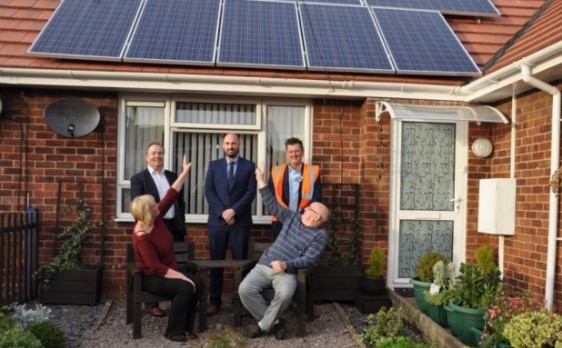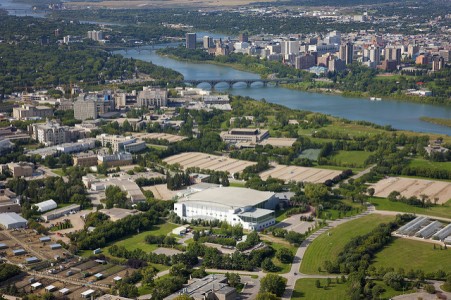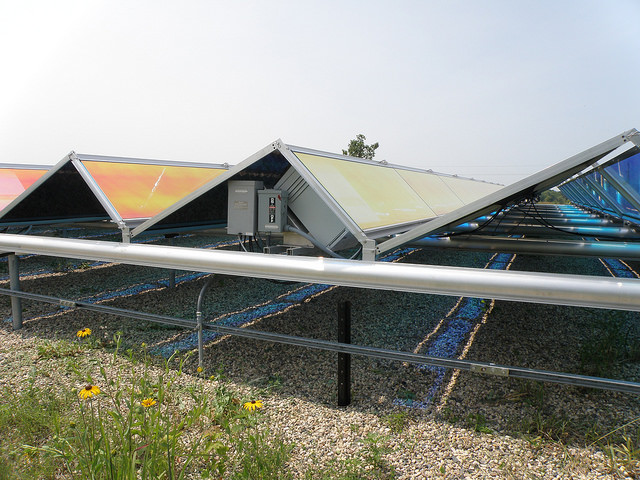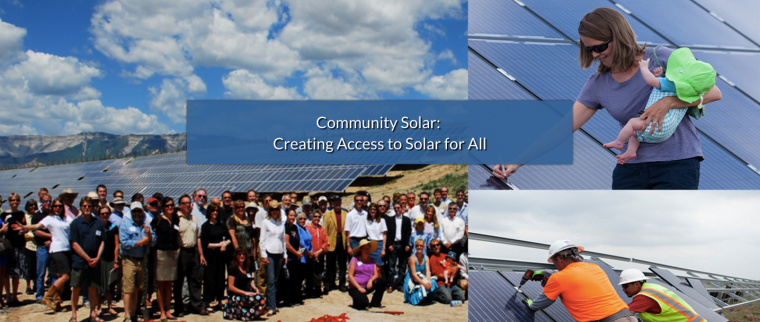The following are summaries from the Community Power Report, which regularly posts stories on community-based renewable energy projects taking place all around the world.
Boston housing provider help households save on energy bills
Jan 5th, 2016
 In the Boston area in England, up to 2000 homes will be getting solar PV panels installed on their rooftops, which will not only reduce carbon emissions and lower their electricity bills, but also generate income for their community fund, Empower Community Solar.
In the Boston area in England, up to 2000 homes will be getting solar PV panels installed on their rooftops, which will not only reduce carbon emissions and lower their electricity bills, but also generate income for their community fund, Empower Community Solar.
The project is a collaboration between local housing provider Boston Mayflower and energy efficiency specialists Corgi Energy and Think Sustainable Energy. Through the Feed in Tariff program by the UK Department of Energy and Climate Change, this initiative is projected to generate up to $7 million in investments for the fund, which will be re-invested by local residents in causes that will benefit the surrounding area. Sounds like a win-win situation for Boston residents!
City of Saskatoon plans biomass project to divert elm wood from landfill
Feb 7th, 2016
 The City of Saskatoon in Saskatchewan is planning to burn its diseased elm wood to heat a local community greenhouse instead of sending it to the landfill. Every year, 700-900 tonnes of wood waste is sent to the landfill, costing the city $75,000 in tipping fees. The new plan to burn the wood waste in a biomass boiler would be able to generate 32,000MW of energy, as well as reduce the need for natural gas use by 85%, accounting for another $75,000 in cost savings.
The City of Saskatoon in Saskatchewan is planning to burn its diseased elm wood to heat a local community greenhouse instead of sending it to the landfill. Every year, 700-900 tonnes of wood waste is sent to the landfill, costing the city $75,000 in tipping fees. The new plan to burn the wood waste in a biomass boiler would be able to generate 32,000MW of energy, as well as reduce the need for natural gas use by 85%, accounting for another $75,000 in cost savings.
The city’s partner in this project, the Saskatoon Food Bank and Learning Centre, has completed a feasibility study to build a food bank with a 6000 sq. ft. community greenhouse attached to it. The study estimated that the project will cost $3.4-$3.6 million, including the construction of a biomass boiler and a solar panel system. In addition to reducing fossil fuel consumption, this project will also reduce the total amount of waste sent to the landfill—a step forward for the city’s waste diversion efforts and a positive sign for the environment!
U.S. national trade association for community solar officially launches
Feb 9th, 2016
 In the United States, a national trade association for community solar, called the Coalition for Community Solar Access (CCSA), has been established. The CCSA’s initial goals are to open markets in key states, serve as the resource for policymakers, utilities and advocates who seek clear, practical options for establishing community solar* programs, and to be the messenger to highlight the growing success of the community solar market. The CCSA will be partnering with consumers, local stakeholders and utilities to implement effective and innovative policies and programs to make sure American communities who are interested in participating will be able to benefit from solar energy generation that is clean, affordable and reliable.
In the United States, a national trade association for community solar, called the Coalition for Community Solar Access (CCSA), has been established. The CCSA’s initial goals are to open markets in key states, serve as the resource for policymakers, utilities and advocates who seek clear, practical options for establishing community solar* programs, and to be the messenger to highlight the growing success of the community solar market. The CCSA will be partnering with consumers, local stakeholders and utilities to implement effective and innovative policies and programs to make sure American communities who are interested in participating will be able to benefit from solar energy generation that is clean, affordable and reliable.
In addition to providing environmental benefits, community solar has the ability to spur job creation within local communities, contributing to the local economy. Currently, up to 200,000 Americans are employed in the community solar industry, which serves approximately 750,000 customers. A study conducted by the NREL also found that community solar has immense market potential, with the capacity to generate up to $16 billion in investments and up to 11 GW of installed electricity generation through 2020.
*Community solar refers to local solar facilities shared by individual community members, who receive credits on their electricity bills for their portion of the power produced. The primary advantage of community solar is that residents can gain access to the benefits of solar energy generation without being constrained by the physical attributes of their home or business, such as roof space, shading, or whether or not they own their residence.
Header Image source: CCSA website
Image of City of Saskatoon: Canadian Light Source, on the U of S campus by Flickr user CLS Research Office, licensed under CC BY-SA 2.0
Image of solar panels: CERTs Community Solar Tour by Flickr user Clean Energy Resource Team, licensed under CC BY-NC 2.0

